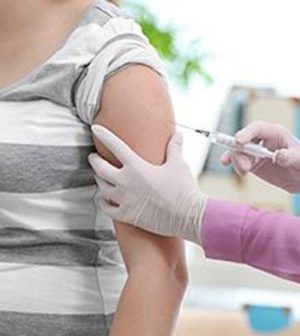- Could Your Grocery Store Meat Be Causing Recurring UTIs?
- Are You Making This Expensive Thermostat Error This Winter?
- Recognizing the Signs of Hypothyroidism
- 10 Strategies to Overcome Insomnia
- Could Artificial Sweeteners Be Aging the Brain Faster?
- Techniques for Soothing Your Nervous System
- Does the Water in Your House Smell Funny? Here’s Why
- Can a Daily Dose of Apple Cider Vinegar Actually Aid Weight Loss?
- 6 Health Beverages That Can Actually Spike Your Blood Sugar
- Treatment Options for Social Anxiety Disorder
Wrong RSV Shots Given to Some Pregnant Women, Young Kids

More than two dozen toddlers and at least 128 pregnant women received RSV vaccines they should not have gotten, U.S. health officials say.
The mixup, reported by the U.S. Centers for Disease Control and Prevention, follows approval this winter of two vaccines against respiratory syncytial virus (RSV). The virus is particularly dangerous to older people and infants.
One vaccine — Pfizer’s Abrysvo — was approved for pregnant woman, with the aim of protecting the fetus. The other — GSK’s Arexvy — was not.
Neither shot was approved for young children.
“It is very upsetting that this should happen,” Dr. Sarah Long, a professor of pediatrics at Drexel University in Philadelphia who is also a CDC advisor, told the New York Times.
While no serious harms have been confirmed, in most cases the outcome is unknown.
Long said she was more concerned about the 25 children under the age of 2 who received an RSV vaccine than the pregnant women who received Arexvy or their infants.
Animal testing suggests Arexvy might make RSV worse in toddlers, the U.S. Food and Drug Administration has said.
The CDC recommends that children who received either vaccine be given nirsevimab (Beyfortus), a protective monoclonal antibody.
Some infants who received an RSV vaccine were meant to receive nirsevimab, the Times reported.
The FDA approved Abrysvo only for pregnant women between 32 and 36 weeks of pregnancy, amid concerns about a slightly higher, but statistically insignificant, risk of preterm birth. The vaccine is recommended only from September through January, peak RSV season.
Some pregnant women apparently got GSK’s vaccine because Pfizer’s shot was not available and pharmacists thought they were interchangeable.
Amy Gardner, 39, a former kindergarten teacher in Cleveland, Tenn., told the Times that she’s looked for Pfizer’s RSV vaccine Abrysvo in several pharmacies for her pregnant daughter. Finally, in mid-September, she found a pharmacy that said they had the vaccine on hand.
However, her daughter got Arexvy instead.
Gardner believes the mix-up could have triggered her daughter to go into premature labor a few hours later.
“We’re all human, but there has got to be more checks and balances than this,” Gardner said.
Long and other experts believe the similarity of the vaccines’ two names — Abrysvo and Arexvy — could have helped cause the mixups.
“It’s just horrible — why, why did they do this?” Long said. “Lots of people got paid a lot of money to make up these names, and I don’t get them.”
RSV is a highly contagious respiratory virus that spreads during fall and winter. It affects the lungs and can lead to life-threatening pneumonia.
The virus is a leading killer of children around the world, and up to 80,000 kids under 5 go to the hospital with RSV infections each year, according to the CDC. As many as 10,000 older adults a year die from RSV.
More information
The U.S. Centers for Disease Control and Prevention has more about vaccination for respiratory synctytial virus, RSV.
SOURCE: New York Times
Source: HealthDay
Copyright © 2026 HealthDay. All rights reserved.










